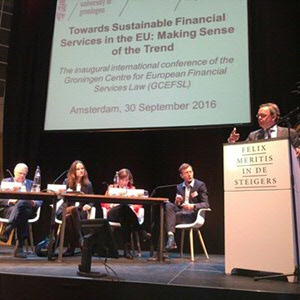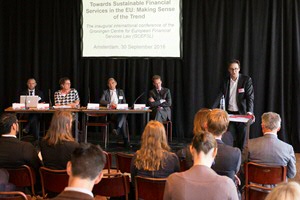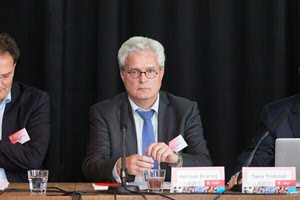Conference report
GRONINGEN CENTRE FOR EUROPAN FINANCIAL SERVICES LAW (GCEFSL)
Inaugural International Conference ‘Towards Sustainable Financial Services in the EU: Making Sense of the Trend’

INTRODUCTION
On 30 September 2016 the Groningen Centre for European Financial Services Law held its inaugural international conference in Amsterdam on the topic ‘Towards Sustainable Financial Services in the EU: Making Sense of the Trend’. The conference brought together leading academics, financial supervisors, legal practitioners, as well as representatives of consumer associations and the financial services industry, attracting more than than one hundred delegates from a broad spectrum of backgrounds and experience levels. The meeting was a reflection of the growing recognition of the need for sustainable financial services for consumers and SMEs in the aftermath of the global financial crisis, the increased regulatory attention to such services, both at EU and national level, as well as much controversy surrounding many newly adopted regulatory measures and supervisory practices, notably from the point of view of their ability to ensure the sustainability of financial services in the future. While the general discussion on the conference theme took place at the plenary session, specific post-crisis developments were debated during four parallel sessions. In the following, we give an overview of the issues covered during the conference and briefly highlight the content of each presentation.
TOWARDS SUSTAINABLE FINANCIAL SERVICES – GENERAL ISSUES
An academic perspective on the role of law and/or economics

In her opening speech prof. Olha Cherednychenko (University of Groningen / Director of the Groningen Centre for European Financial Services Law) welcomed participants to the conference and pointed to an emerging consensus on the need for a closer link between the European financial services sector and society in the post-crisis era. At the micro-level of actors, it was clear from the crisis that incentives of key actors (banks, credit-rating agencies and consumers/investors) were fundamentally misaligned. At the level of organisational infrastructure, it became clear that internal systems, processes and cultures within financial institutions were inadequate, and there were significant weaknesses in the regulatory capacity of both regulators and firms. According to Cherednychenko, however, many questions still exist as to the way forward for the financial services industry and financial services regulation: Is there a socially richer and coherent regulatory agenda behind the post-crisis regulatory efforts? Has the financial crisis led to a fundamental rethinking of the role of private sector finance and the goals of retail financial services regulation? Or are we just trying to fix the loopholes in the old system by developing piecemeal technocratic solutions? In particular, do we have a clear vision of how to ensure financial stability and a high level of investor protection – both ranking high on the post-regulatory agenda – without undermining economically and socially useful financial innovation in the financial markets? In her view, one of the problems is that now nearly a decade since the outbreak of the financial crisis, academics, financial supervisors, legal practitioners and representatives of the industry still operate within different frames of reference, talking past each other about the way forward for financial services and the financial service regulation in the EU. Besides, within law as an academic discipline, there are still invisible boundaries between those specializing in European law, administrative law, regulatory law, private law, company law, or comparative law. The aim of this inaugural conference of the Groningen Centre for European Financial Services Law is to create a platform for mutual dialogue among key stakeholders. The dialogue that would transcend the boundaries between different fields of law and different disciplines. The dialogue about the way forward for financial services, financial services law and financial supervision, using the concept of sustainable financial services. While the meaning of this concept itself is open to debate, it generally reflects the need to focus on long-term needs of their recipients and societies at large, and not just on the speed and volume of financial transactions in a drive to maximise commission income and short-term transaction-based profit. In this way, the Groningen Centre for European Financial Services Law seeks to contribute to developing an overarching vision on sustainable financial services post-crisis and designing a legal framework that would enable financial institutions to provide such services.

The first keynote speech at the conference was delivered by prof. Mads Andenas (University of Oslo / Director of the Centre for Corporate and Financial Law at the Institute of Advanced Legal Studies, University of London) who addressed the role of law in the post-crisis era. In his words, there is an assumption that financial markets have important social utility and that regulation should enhance that social utility. However, the relationship between financial market regulation and law is complicated. In the pre-crisis period, financial regulators were generally reluctant to have formal powers to intervene in financial markets and, to some extent, were holding back the law. This was reflected in their focus on substantive regulatory norms rather than enforcement and sanctions, let alone private law. This landscape is changing post-crisis with important supervisory competencies having been moved up to EU level and, in particular with the creation of the Banking Union and the Single Supervisory Mechanism for the Eurozone. Following the establishment of the new institutions at EU level based on law and legal procedures in response to the crisis, the environment is becoming more legal. Law, and hence enforcement and sanctions, have a more important role to play compared to the national level pre-crisis, strengthening the sustainability of financial regulation and supervision. At the same time, the operation of the new European institutions and the emergence of new regulatory concepts, such as burden-sharing by shareholders and subordinated creditors as a condition for State aid, create uncertainties. In this context, Andenas also addressed the impact of financial services law on the well-established legal disciplines, such as administrative law, contract law, tort law and EU law, as well as the role of legal scholarship. He described the financial services field as the most interesting laboratory for the development of these legal disciplines and pointed to the need for a greater involvement of legal scholars with this area. In his view, so far, legal scholarship in this area has been reactive, fragmented and conservative, both in the pre- and post-crisis era. There have been very few scholars that have considered the implications of the developments in the financial services area for the general fields of law, and this must change. Finally, Andenas also identified climate change and Brexit as challenges to the sustainability of financial services in Europe.

A critical perspective on the role of economics in the financial services field was provided by the second keynote speaker – prof. Hans Schenk (University of Utrecht School of Economics / Co-founder of the Sustainable Finance Lab). His central claim is that the traditional economic perspective has contributed to the global financial crisis and, what is worse, it has not changed since. He first recalled the developments that preceded the crisis, among which a tsunami of derivatives; a tsunami of speculation in securitised assets ; a tsunami of leveraged buy-outs and takeovers ; a tsunami of special purpose vehicles ; an explosion of executive incomes; a concomitant focus on market (shareholder) rather than real value, as well as three decades of deregulation in financial markets and banking. These developments resulted, inter alia, in a virtual elimination of transparency, obscuring the relation between original risk and ultimately traded assets; a replacement of rules of behaviour that had proved to be sustainable in the past with the idea that parties would behave like homo economicus; the financialization of the economy with the focus on the generation of real wealth being lost; increasing deal-making just for the purpose of making a trading buck rather than increasing productive efficiency; the booming off-balance economy hiding both assets and liabilities; the elites pocketing short-term revenues; and unprecedented focus on mergers & acquisitions (M&As) that are normally underwritten by banks. According to Schenk, all this just mirrored modern economic theory. The application of this theory to capital markets has led to the assumption that investors are generally rational and thus value securities rationally. To the extent that some investors are irrational, they are met in the market by rational arbitrageurs who eliminate their influence on prices. Under these conditions, according to the current science of economics, recurrent and/or systemic destructions of wealth are impossible. In an efficient market for corporate control, for example, it is assumed that there will be a permanent process of takeovers of underperforming firms by efficient investors who are aware of any low market values. Thus, mergers, on average, succeed in maximising ‘profits’. However, these economic assumptions are not supported by empirical findings. For example, the latter show that total returns of M&As are negative in the long run: M&As destroy shareholder value. Even worse is that the current economic assumptions encourage perverse behaviour in financial markets. In the opinion of Schenk, therefore, the traditional economic perspective has strongly contributed to the creation of unsustainable financial markets and banking. Moving away from this perspective requires noting less that a full overhaul of the economic science’s paradigm. But is this going to happen? Schenk is rather pessimistic about this given the recent developments around academic research (such as the growing dependence on external funding) resulting in th e pressure to follow the mainstream path. In response to the critical question of whether this account is not exaggerated given that the economic profession is heterogenous and also includes, for example, institutional economics and behavioural economics, he pointed out that, at present, those who work in these emerging areas are still only a tiny minority, lone wolves that do not belong to the mainstream. He concluded by paraphrasing Gandalf: ‘What I’ve found is that it is the small papers, every day deeds by ordinary economists that can keep the darkness at bay, that can hold evil in check, not the so-called leaders of the troops. May God bless them, and give them the strength, and research opportunities, to work for sustainability.’

A law and economics perspective on the issue of the sustainability of financial services was presented by the third keynote speaker – prof. Fernando Gomez (Pompeu Fabra University, Barcelona). He focused on the issue of asymmetries between parties to financial transactions, in particular credit transactions, contrasting legal and economic views on this issue. He noted that financial transactions are an important tool to provide credit that fuels trade and economic activity and advances social welfare. However, there are major challenges on the way towards beneficial financial transactions between individuals and/or firms. These challenges operate at two different levels: (1) the level of an individual transaction (the ‘micro’ level), and (2) the aggregate or societal level (the ‘macro’ level). While the crisis has clearly revealed the importance of the ‘systemic’ effects of a failure of financial transactions at the macro level, legal discourse typically focuses on the micro level of an individual transaction. By contrast, economics is well aware of the importance of both levels. Exploring the two levels separately is useful to shed light on how law can address the problem of asymmetries in financial transactions. In the context of credit transactions, major challenges at the micro-level include transactions costs, commitment or incentive problems, imperfect information, and cognitive and behavioural shortcomings. The extent to which different parties face these challenges is influenced by information asymmetries. For example, some parties, like consumers, may be more prone to cognitive biases and act differently from what the rationality model would assume. The asymmetries may in turn have huge consequences for parties to transactions. Thus, for example, following the inefficiency of mortgage loans in Spain, many consumers have lost their homes. In addition, inefficient transactions at the micro-level may result from the wrong expectations of the parties (even in the absence of information asymmetries) and, more generally, the events at the macro level. In fact, the macro level presents even greater challenges. Everything what happens in society benefits some and hurts others. Every policy change, therefore, will have winners and losers. In particular, it is impossible to aggregate social preferences. That is why, when addressing the failures in financial transactions, law needs to make trade-offs between the costs and benefits at both the micro and macro levels. According to Gomez, this task differs from the traditional balancing of competing rights and interests in an abstract way typical of a legal analysis. Making trade-offs is a more painstaking exercise that entails the need to define the markets that will be affected by the proposed legislation; to specify the failures that would be addressed by it; to identify the alternatives; to anticipate the effects; to identify the costs of various measures; and to set up a common metrics for a cost-benefit analysis. This is not an easy exercise given, among other things, the difficulty involved in anticipating the effects of a new measure, the heterogeneity of the affected population, and political constraints. But it needs to be done. Unfortunately, such an analysis has not been performed with respect to a much celebrated Mortgage Credit Directive which has introduced new consumer protection provisions (such as the creditor’s duty to refuse credit to the consumer in case of the negative outcome of the creditworthiness test). A different approach to policymaking is needed to establish whether such provisions are desirable, concluded Gomez.
Consumer vs. financial industry perspective

The consumer perspective on the issue of sustainable financial services was presented by Greg van Elsen (Senior Financial Services Officer at the European Consumer Association (BEUC)). In his speech, he focused on consumer needs with respect to financial products and how law and regulation can help to meet them. He noted that most consumers do not have very complicated needs. They just need simple financial products, like banking accounts, insurances or pension products. Responding to the basic financial needs of consumers is a prerequisite for a sustainable financial system. However, this prerequisite has not been met so far. It is still very hard for consumers to make the right financial choices. Consumer trust in financial markets is still very low. We have seen the mis-sellings of financial products across the whole Europe (such as ‘woekerpolissen’ in the Netherlands, payment protection insurances (PPIs) in the UK, toxic bonds in Slovenia, and CoCos in Cyprus). Such mis-sellings may have a dramatic impact on the lives of consumers. According to Van Elsen, there are two major sources of consumer detriment: (1) the lack of simple, transparent and cost effective financial products, and (2) the lack of independent financial advice and guidance in the distribution chain. With respect to financial product quality, investment and pension products give rise to particular concerns. These products often involve a multitude of fees and charges which have a huge impact on the capital accumulation over their total lifetime. This is disturbing given that consumers become increasingly dependent on the financial markets for meeting their basic needs. The problem with respect to the distribution channels is that the idea of acting in the best interest of the consumer is generally not reflected in the current business models. Commission-based sales across Europe are still widely predominant (with only few exceptions, like the Netherlands). This has a very detrimental impact on the quality of financial advice. Given the inability of the traditional consumer protection tools based on disclosure and conduct of business rules to prevent consumer detriment, financial product complexity, as well as behavioural and cognitive limitations of consumers, Van Elsen welcomed the adoption of more intrusive EU regulation post-crisis, particularly with respect to product governance and intervention. At the same time, he stressed that in order to ensure the effectiveness of these measures, strong regulators are needed. At present, however, many questions exist as to how the new measures will be enforced. He also pointed to the need to develop a framework for simple, transparent and cost effective products that would meet basic financial needs of consumers. ‘Consumers do not need more choice but better choice’, concluded Van Elsen.

The first speaker to address the financial industry perspective on the conference theme was Belén Romana (Non-Executive Director at Santander Group and Aviva plc.) . She chose to do so from the global point of view. One of the major challenges faced by the financial industry in the near future is huge growth in global population and average income. 3 billion more middle class consumers are expected to participate in the global economy by 2030. This development will entail huge demand for resources, like energy, food or water. At the same time, it also brings new opportunities to increase energy efficiency, reduce food waste, improve irrigation techniques, to name just a few. According to Romana, we need to think how to finance these opportunities. Traditional financial theory considers a narrow set of values, namely, financial risk and return, leaving little room for externalities. By contrast, sustainable finance theory should recognize both a greater range of potential values (including altruism for current and future generations, and concern for ecological resilience) and a larger set of potential returns or losses, both financial or otherwise. In the opinion of Romana, this idea is well reflected in the definition of a ‘sustainable financial system’ adopted by the United Nations Environmental Programme (UNEP) in 2016. Such a system is defined as ‘one that creates values, and transacts financial assets, in ways that shape real wealth to serve the long-term needs of an inclusive, environmentally sustainable economy’. Romana also identified four current trends contributing to the growth of sustainable finance: 1) the rise of ‘blended value’ investing that integrates social, environmental and other elements in securities valuation; (2) the growing recognition of the relationship between sustainability factors and systemic risk; (3) the rise of financial innovation (like carbon emission rights trading or crowdfunding platforms); and (4) the creation of infrastructure for sustainable finance that would enable investors to value risks and returns in the wider context. According to Romana, sustainable finance has clearly gained ground in companies and the economy. The main question today is whether the alignment between capital markets and the financial needs of inclusive and sustainable economy should be accomplished by means of voluntary or mandatory rules. At present, we have a combination of both. However, nobody appears to have a comprehensive view on how all the public and private regulations currently in force interact with each other and what impact this has globally. There is a strong need to gain such a view and be cautious of the side effects of regulatory measures.

The stance of the Dutch banking industry was presented by Chris Buijink (President of the Dutch Banking Association (NVB)). He noted that since the outbreak of the financial crisis in 2008, legislators, regulators and the banks themselves have been working hard on making the financial system more stable and less risky. In his opinion, the Banking Union is a good example of what can be achieved if politicians, regulators and bankers work together. However, not all problems can be fixed through legislation. As Plato said: ‘Good people do not need laws to tell them to act responsibly, while bad people will find a way around the laws.’ Change must come from within the financial sector itself, especially when it comes to the culture within banks and the behavior of bankers. Buijink strongly believes that it is impossible to change the culture within banks by setting rules from the outside alone. And this is where ethics comes into the equation. The following story provides a good example. Two years ago Buijink attended a seminar with the bishop of Canterbury who used to be an investment banker. As a young banker he had invented a new financial product that would make his bank a lot of money and was perfectly legal. But it was a very complicated product that many consumers would not understand. Before launching the product, his boss asked him one very important question: We could launch this product, but should we?

In the view of Buijink, this is exactly the right question that needs to be asked by bankers on a regular basis. He also pointed to the adoption of the future-oriented banking package as an important step towards achieving an ethical, customer-oriented and sustainable banking sector in the Netherlands. The package lays down three building blocks: the Social Charter outlining the position of the Dutch banking sector in society as a whole and its values; the new Banking Code that safeguards sound governance in each bank and contains conduct of business rules for employees; and the rules concerning the ‘banker’s oath’ by taking which bank employees declare to act in the customers' interests. Although the banker’s oath is not a ‘silver bullet’, in the opinion of Buijink, it is a meaningful tool to get the discussion on ethical issues in banking going. He concluded that the adoption of tighter public regulation and self-regulation in the post-crisis period has been a major step towards sustainable financial services in Europe. At the same time, the financial industry is changing so fast that people often ask whether banks will still be there in ten years’ time. Customers are asking for innovations. They want more digital services, more easy to use products, more transparency and lower costs. According to Buijink, if banks want to provide sustainable financial services, they will have to make sure that they have a sustainable business model. This is a tough issue given a low interest rate environment, the requirements for high capital reserves, and fierce competition from tech start-ups and big techs, like Apple and Google. Nevertheless, Buijink is optimistic about the future of banks, as the new technology offers creative opportunities for providing better services for customers and building a new financial eco-system. Banks have to stay safe and to ensure that consumers experience the values of the industry in every contract, be it offline or online. This is the way forward to restore public trust in the banking industry.
A perspective from a European supervisory authority

The European supervisory perspective on the sustainability of financial services was presented by dr. Steven Maijoor (Chair of the European Securities and Markets Authority (ESMA)) (who graduated from the University of Groningen)). Focusing on securities markets, he identified three elements that are key to ensuring sustainability: (1) stability of the financial system as a whole; (2) investor protection; and (3) consistent supervision across the EU. Answering the question of whether the financial services sector is now sustainable, he noted that there has been considerable progress in this direction since 2007-2008. However, we are not there yet given that we still witness very disturbing developments in terms of sustainability. Among them are banks being under pressure in the wake of the UK referendum on Brexit and the continued mis-sellings of financial products. In his view, sustainability should not be assessed in absolute terms because there will always be periods of instability and mis-selling cases. The focus should rather be on the improvement of the sustainability of the financial system. At present, we do not have much experience in responding to financial stability risks, such as a low interest rate environment. An intellectual exercise is needed to fill the knowledge gap concerning the macro-prudential tools to respond to such risks in the non-banking sector. Several challenges also lie ahead regarding investor protection. Among them are the mis-sellings of financial products to consumers, high costs of retail financial products, in particular structured products, and that of product distribution. Speaking about the regulatory measures to address these challenges, Maijoor noted that in the past, the emphasis at EU level has been on the financial stability side rather than on the consumer side. In the area of financial markets, therefore, ESMA’s activities focused, for example, on the regulation of derivative trading, hedge funds, and credit rating agencies. However, once the Markets in Financial Instruments Directive II (MiFID II) is implemented, there will be better measures in place in the area of consumer protection. Several issues deserve special attention in this context. First, MiFID II implies a shift from the information model of consumer protection towards a more paternalistic model that includes, for example, the product governance and intervention regime. Second, in addition to regulatory measures, the importance of enforcement cannot be underestimated. While a lot can be achieved through a dialogue with financial firms, at the end of the day you also need to have a big stick to be able to enforce regulation. Third, a better balance is needed between consumer and industry participation in the law-making process. In contrast to the financial industry that is extremely well-organised to exert influence on this process, it is much more difficult for consumers to do so. In the view of Maijoor, financial regulators, in particular ESMA, have a responsibility to help consumers to better organise themselves. Fourth, it is important to ensure that consumers in all Member States have the possibility of collective redress. While providing such redress is, in principle, a matter for courts, regulators could play a role in this context by providing evidence. Fifth, financial innovation is needed to improve the quality of products and services in the retail market. As the example of ‘robo advice’ suggests, intrusive regulatory measures, like third-party commission bans, can stimulate such innovation. Finally, while investment firms are exercising their ‘passporting’ rights under EU law, it is important to ensure co-ordination between host- and home regulators. Such coordination is needed to make sure that there is sufficient information exchange between regulators to be able to prevent mis-selling of financial instruments.
TOWARDS SUSTAINABLE FINANCIAL SERVICES – SELECTED ISSUES
Top bankers under scrutiny: The supervision of behaviour and culture and the fit and proper test in European and Dutch law

The first parallel session was devoted to one important post-crisis development in the area of financial supervision, i.e. the supervision of behaviour and culture within financial institutions. In his opening statement, prof. Lodewijk Smeehuijzen (VU University Amsterdam) who chaired the session quoted from the introduction to the book by Paul Bate ‘Strategies of cultural change’: ‘Writing a book about a cultural change is a daunting task’. If this is the case, Smeehuijzen wondered what kind of task it is to supervise culture. Speaking about the empirical study he undertook together with prof. Cynthia Williams (York University, Toronto) on whose behalf he was also acting at the conference, he noted that most CEOs of financial institutions are of the opinion that behaviour and culture are key to their institutions. However, there is no general agreement as to whether and, if so, by whom and how, these should be supervised.

The financial supervisory perspective on this issue was presented by Frank Elderson (Executive Director of the Dutch Central Bank (DNB)). He noted that the financial crisis has made it clear that human behaviour plays a critical role in the functioning of financial institutions and affects their performance. Therefore, while in the past supervision has focused on data and figures, after the crisis an additional forward-looking approach is needed, i.e. the supervision of behaviour and culture within financial institutions. He identified two different methods used by the Dutch Central Bank in this context, both of which, according to him, have been generally supported by the financial sector: (1) at an individual level – the fit and proper test for board members as the carriers of culture within financial institutions, and (2) at a group level – ensuring that financial institutions make the necessary changes to control risky behaviour when it comes to a decision-making process, communication and leadership. With respect to the latter method, Elderson mentioned three frameworks that are being applied: (1) board effectiveness (observing group dynamics and decision-making in a boardroom); (2) risk culture (determining to what extent specific behavioural patterns within a particular institution influence risk-taking); and (3) institutional change effectiveness (determining to what extent groups within a financial institution are willing to change). When developing this approach, the Dutch Central Bank extensively relied on the (academic) knowledge and experience from around the world. The question is to what extent the European Central Bank (ECB) is also willing and able to take this novel approach on board. Speaking about the Dutch experience, Elderson noted that the financial supervisor only draws attention to the patterns of irresponsible and unethical behaviour. However, in the end, it is not the supervisor who should be doing this but the financial institutions themselves. The spirit of cooperation between the financial supervisor and the financial sector is vital for the success of the new approach.

Prof. Heinrich Winter (University of Groningen) addressed the fit and proper test for board members of financial institutions. He identified a number of controversial issues regarding it: How to implement the fit and proper test? In particular, how to operationalize broadly formulated concepts, like ‘fit’ and ‘proper’? How does this test relate to boardroom observation? What about the balance of power between regulators and financial institutions? What about legal protection for individuals? What about self-controls within financial institutions and the ability of the sector to put its own house in order? Is the fit and proper test the most suitable strategy to improve the quality of governance in financial institutions? And who controls the controllers? More specifically, his research focuses on the functioning of the test. The issues in question include, among others, whether the evaluation process is in conformity with the basic standards of equality of arms and fair balance, how the regulated persons experience it, and what lessons can be learned from other regulated sectors and European jurisdictions. In the opinion of Winter, in a few years the fit and proper test is likely to be adopted in many sectors of our economy. The importance of providing answers to the above questions can therefore not be underestimated. In his presentation, he focused on the lessons from the Dutch housing sector where the fit and proper test has been applied since July 2015. His recent empirical study of the experiences of the board members of housing corporations (‘woningcorporaties’) with this test has produced mixed results. In particular, while around 50% of the respondents found the test to be an effective instrument for assessing their qualities, around 30% did not share this view. Moreover, compared to other instruments in place (such as lifelong learning, governance codes, internal evaluations, and external reviews), the respondents considered the fit and proper test to be least appropriate. These findings with respect to the housing sector mirror resistance towards the fit and proper test that can also be observed in the financial sector.

The discussion of the fit and proper test continued with Guido Roth (Partner at Simmons & Simmons and Chairman of the Stichting waakzaamheid financieel toezicht)) presenting a critical perspective on the current Dutch approach to this test. Having acknowledged the importance of suitable directors in the financial sector, he pointed out that Dutch financial supervision laws hardly provide for any procedural safeguards when it comes to the assessment of a particular individual. The Dutch financial watchdogs are entirely free to determine and to shape the assessment process, wearing three hats at the same time – that of a legislator, that of a supervisor and that of a judge. In his view, this concentration of power is unacceptable, given the inevitably vague criteria used in the assessment process (such as ‘authenticity’) and the harsh consequences of the negative outcome for the person concerned (disqualification from acting as a director for an indefinite period of time). The regulated parties are generally reluctant to appeal to the administrative court against the decisions of the financial supervisory authorities in order to preserve a good relationship with the latter. Besides, in many cases there is simply no formal decision which makes it possible to launch such an appeal. In the view of Roth, in order to ensure sufficient procedural safeguards, the fit and proper test should ideally be performed by an independent institution or at least by special officers of the financial supervisory authorities who are sufficiently independent from their supervisory departments and governing boards. In addition, law should guarantee that everyone who is confronted with the negative assessment can appeal to the administrative court.

Prof. Loes Lennarts (University of Groningen / University of Utrecht) added a new dimension to the discussion by focusing on the role of liability law in influencing the behaviour of bank directors. Drawing on the experience with the Dutch DSB bank that became famous for its unsustainable business model and went bankrupt in 2009 after the bank run, she first addressed the possibility of holding bank directors personally liable for causing the bank’s bankruptcy under Dutch law. In her opinion, this is not a very meaningful tool for influencing the directors’ behaviour. In particular, it is not easy to prove that the director’s ‘manifestly improper conduct’ has actually caused bankruptcy. Besides, even if the director is held personally liable, the deterrent effect of such liability would be negligible. Lennarts also demonstrated the limits to the civil liability claims of investors against bank directors, concluding that these, too, are not the most effective means of influencing the directors’ behaviour. In her opinion, covenants providing for the bank executive’s strict liability for a portion of the bank’s liabilities (the so-called clawback) appear to be more suitable for this purpose. At the same time, the drawback of such provisions is that they will ultimately lead to further increases in bankers’ pay.
Financial supervision and civil liability in mass damage cases: The case of interest rate swaps mis-sellings in the Netherlands and the UK
The topic of the second parallel session chaired by prof. Michel Tison (Dean of the Law School at the University of Gent) was financial supervision and civil liability in mass damage cases. The recent mis-sellings of interest rate swaps (IRSs) across Europe, in particular the UK and the Netherlands, provided an interesting case study. IRSs are derivate contracts between counterparties who agree to exchange two interest rate flows, from a floating interest rate to a fixed one or vice versa. Many corporate and government entities, as well as consumers, entered into such contracts in order to manage interest rate risks but ultimately incurred substantial losses. According to Tison, the mis-sellings of such very complex, difficult to understand and high risk instruments should be seen in the broader context of the efforts to ensure sustainable financial services. The latter could be understood as the services which are in the interest of and useful for the customers. One of the interesting issues for debate is whether financial supervisors can play a role in remedying mass damage situations, in particular by awarding financial compensation to the aggrieved parties. Or should we leave it to courts? And what kind of remedy should be appropriate?

Focusing on the UK experience following the mis-sellings of IRSs, dr. Vincenzo Bavoso (University of Manchester) highlighted a number of legal issues identified by the UK Financial Conduct Authority (FCA) in this context. Among them were a high level of product complexity; insufficient disclosure of ‘exit costs’ by banks; failure to ascertain the customers’ understanding of the risks involved; product sales on a non-advised basis; and banks having a conflict of interest when bundling loans with IRSs. Bavoso questioned whether the current legal framework is fit to provide adequate protection to SMEs and financial consumers against IRSs. In his opinion, the major problem is that there is a significant discrepancy between the duties of banks towards their customers under regulatory law and that under English common law. While MiFID II offers a relatively high level of protection when it comes to sales of IRSs to retail investors, the level of such protection under common law is much lower. The English courts are reluctant to fill in the common law fiduciary duties of banks based on their regulatory duties. In the view of Bavoso, absent the interplay between the two and the private law enforcement of regulatory duties, the protective regulatory regime under MiFID II may fail to prevent similar mis-sellings in the future.

The financial supervisory perspective on the mis-sellings of IRSs to SMEs in the Netherlands was presented by prof. Femke de Vries (University of Groningen / Executive Board Member of the Netherlands Authority for the Financial Markets (AFM)) and Bonne van Hattum (strategist and lawyer at the AFM). They showed that the Dutch AFM, which, in contrast to the UK FCA, does not have formal powers to prescribe a redress scheme, has nevertheless an important role to play in securing redress for the aggrieved clients. After the AFM investigation has revealed that many clients had not received suitable advice concerning the IRSs, the Dutch Minister of Finance asked the banks to perform full review of IRS sales with a view to determining appropriate compensation. However, the AFM, which supervised the review process, concluded that the banks failed to provide such compensation due to errors and inaccuracies in individual files. In order to seek a prompt solution, the AFM advised the Minister of Finance to appoint an independent committee of experts that would come up with a uniform and prescriptive redress scheme and reach an agreement with the banks concerning its application.

In the opinion of De Vries, such a solution allows not only to provide speedy redress for clients who have been waiting for it for a long time but also to avoid the conflict of interest issues that could arise if the financial regulator itself were to prescribe the redress scheme itself. Notably, the Independent IRS Committee reached an agreement with banks four months after being appointed by the Minister. Banks will apply the redress scheme to all clients within the scheme automatically. By accepting the redress offer, the client will give full discharge. Those clients who do not accept the redress offer, can resort to a court or an alternative dispute resolution (ADR) body (i.e. Financial Ombudsman Service). Correct application of the redress scheme will be checked by independent reviewers and supervised by the AFM.

A critical perspective on this novel approach by the Dutch AFM to mass damage cases was provided by dr. Jan de Bie Leuveling Tjeenk (Partner at De Brauw Blackstone Westbroek, Amsterdam). Focussing on the civil law side of the issue, he questioned whether the redress scheme provides a solution that is acceptable to all the parties involved. He noted that such schemes can only provide a solution at a very high level of abstraction without due regard to the specific circumstances of the case. It is also important to keep in mind that if the client does not accept the redress offer, it will depend on the individual circumstances of his case whether the outcome of judicial or extra-judicial proceedings would be more favourable for him. In his view, the balance of the voluntary redress scheme will be distorted if those who get more compensation under the redress scheme than their actual damage opt in and those who think they will be better off going to the court opt out (the so-called ‘cherry-picking’). De Bie Leuveling Tjeenk also highlighted three types of civil claims in relation to IRS contracts which are common in the Netherlands: (1) avoidance for mistake; (2) rescission for breach of contract; and (3) damages for breach of the duty of care. Given that the issue of causality arises both in relation to a claim for rescission and a claim for damages, it does not matter much which particular technical root is followed. He also posed a question concerning the role of civil courts in resolving cases outside a collective redress scheme. Given the variety of solutions provided by the lower civil courts in individual disputes involving IRSs, he wondered whether the Dutch Supreme Court could give a decision on a high abstraction level that would offer guidance as to how similar cases are to be resolved. At the same time, he admitted that one of the obstacles for civil courts playing a greater role in mass damage cases in the current procedural set up is that civil litigation takes time. This problem needs to be addressed for courts to be able to play such a role.
Ensuring compliance with EU and Dutch principles-based regulation: The role of financial supervisory authorities

The third parallel session chaired by prof. Takis Tridimas (King’s College London, University of London) was devoted to the role of financial supervisory authorities in ensuring compliance with EU and Dutch principles-based regulation. Tridimas identified two issues that are key in this context: legal uncertainty and the need for judicial protection. In his view, the topic in question provides a striking illustration of the decreasing degree of legal certainty in the area of financial law more generally, in particular as a result of the post-crisis intervention by the EU. What is more, it almost looks as if the EU intentionally causes a high degree of legal uncertainty, especially when it comes to the regulation of financial institutions or the economic and monetary union. According to Takis, an uneasy relationship between principles-based regulation and legal certainty does not imply that principles-based regulation is contrary to the rule of law. In fact, such regulation is certainly needed in order to provide a unified framework for rules. The issue of judicial protection in turn is inherently connected with the issue of enforcement. The interplay between public and private enforcement mechanisms and remedies available to the aggrieved party deserve special attention.

The financial supervisory perspective on the topic in question was provided by Wijnand van der Beek (Manager Strategy, Policy and International Affairs at the Netherlands Authority for the Financial Markets (AFM) and Chair of the Joint Committee of European Supervisory Authorities Sub-Committee on Consumer Protection and Financial Innovation) and Bonne van Hattum (strategist and lawyer at the AFM). They discussed the current approach of the Dutch AFM to supervision and enforcement, in particular with respect to open-ended norms, such as the recently introduced general duty of care of financial institutions towards their clients. A balanced mix of different instruments is central to this approach aimed at preventing new mis-selling scandals and restoring public trust in the financial sector. On the one hand, the AFM resorts to formal enforcement tools (such as an administrative fine) in cases involving (intentional) violations of rule-based regulation. On the other hand, the AFM does not use such tools when it comes to principles-based regulation which is meant to promote responsible attitudes and culture within the financial industry. As it is impossible to prescribe exactly how these outcomes are to be achieved, the AFM supervises compliance with principles-based regulation by using more informal means (such as a conversation through which norms are conveyed (normoverdragend gesprek)) in dialogue with the regulated financial institutions. In order to ensure their compliance with the general duty of care, the AFM also recommends financial institutions to consider, inter alia, whether they would purchase the financial product or service they (intend) to offer to consumers themselves, look beyond financial supervision legislation (in particular, consider the private law duties of care developed by civil courts), and study and apply insights from behavioural economics in the interest of consumers.

This approach by the AFM was criticised by Stijn Franken (Partner at NautaDutilh, Amsterdam). He pointed out that that there has been a substantial decrease in formal sanctions imposed by the AFM in the last five years. Instead, the AFM has increasingly turned to informal enforcement practices. While the AFM does not formally rely on principles-based regulation, norms, like the general duty of care, do provide it with a formal stick in case financial institutions do not voluntarily comply with its interpretation of such open-ended concepts. By way of illustration, Franken referred to the case of IRSs discussed in the previous parallel session where the banks that initially opposed the idea of settlement have agreed to compensate their clients ‘voluntarily’. In his opinion, this supervisory approach is unsustainable because it exposes the AFM to a new risk of being captured by public opinion or politics. While principles-based regulation is important, it is fully inapt for public enforcement. In particular, absent equality of arms and full judicial review, public enforcement of principles-based regulation does not provide the required level playing field. It is not based on transparency or evidence-based decisions either. Therefore, it leads to informality, uncertainty, defensive behaviour as a result, and ultimately to ‘harmless but illegal behaviour’ being punished. But do we have an alternative? In the view of Franken, a better option is to enforce principles-based regulation in the area of client/consumer protection by means of private law. Under Dutch law, for example, the AFM can already require an immediate court order or injunction by means of the preliminary relief proceedings, if necessary even with a penalty (Article 3:305 of the Dutch Civil Code in conjunction with Article 1:25 of the Financial Supervision Act). The private law enforcement root allows for full debate on complex issues with due regard to the principle of equality of arms and subject to full judicial review. It is also transparent and evidence-based. Therefore, private enforcement of principles based regulation leads to rule-based decisions, more certainty and addressing ‘harmful, thus illegal’ behaviour. As such, it could play an important role in ensuring the sustainability of financial markets.

A different solution to the problem of uncertainty surrounding public enforcement of principles-based regulation was presented by prof. Herman Bröring (University of Groningen). In his view, given a high degree of complexity and innovation involved in the financial services industry, financial supervision legislation cannot achieve its regulatory objectives without open-ended norms. According to the case law of the European Court of Human Rights and the Dutch courts, such norms can be compatible with the principles of legality, lex certa and transparency. Furthermore, the public authorities’ discretion is not an either/or matter: it involves a sliding scale from very limited to very broad discretion. In the course of time, the degree of discretion can decrease as a result of new case law or new (public or private) soft law. Bröring noted that, at present, the key problem is a distance and conflict between the financial regulators and the regulated. The way in which the two interact with each other resembles that of of street cats. How can we resolve this problem? In his opinion, the way forward lies in improving co-operation between the regulator and the regulated in ensuring compliance with principles-based regulation and enhancing the transparency of rulemaking processes. Effective communication between the financial watchdogs and financial institutions in the course of interpretation and application of open-ended norms is a key factor in this context. On a policy level, the financial regulators could avoid producing additional unclarity concerning the meaning of open-ended norms. In addition, they should make it clear to what extent they follow private soft law and, in case they deviate from it, provide good reasons for doing so.
Consumer protection against dangerous financial products: Product governance/intervention and civil liability in European and comparative perspective
The fourth parallel session chaired by dr. Dirk Ulbricht (Director of the Financial Services Institute (Institut für finanzdienstleistungen (Iff), Hamburg) focused on one of the most far-reaching post-crisis regulatory novelties in the area of financial consumer protection, i.e. the emerging product governance and intervention regimes. These regimes were discussed from the EU and comparative perspective by the representatives of the financial supervisory authorities, practitioners, and academics. Attention was also paid to potential civil liability issues that may arise in this context.

Jonathan Foster (Counsel European Law at the Financial Conduct Authority (FCA), UK) focused on the UK experience in this area. He noted the growing concern about the social utility of financial products and even that of banks in the UK. In this context, he distinguished two regulatory ways of dealing with potentially dangerous financial products: (1) ex post (when the product has already caused consumer detriment) and (2) ex ante (before such detriment has been caused). Financial promotion requirements provide an example of the ex post regulatory measures. In particular, under UK law, a financial promotion made – or approved – otherwise than by an authorised person is a criminal offence. Interestingly, actions taken against firms and individuals for breach of the financial promotions requirements have led to over 60 million pounds in fines since 2009, as well as prohibitions on firms and individuals to conduct financial services business. By contrast, the newly introduced product intervention regimes provide an illustration of the ex ante regulatory measures aimed at preventing dangerous financial products from reaching consumers. Since 2013, the FCA has the power to make temporary product intervention rules. This power was used in 2014 to restrict the ability of financial institutions to distribute contingent convertible instruments (CoCos) to retail investors. In the opinion of Foster, there is clearly a risk to stifle financial innovation if the financial regulator intervenes too early to ban the product. At the same time, the criteria applied by the FCA when deciding whether or not to intervene address this concern. In addition, Foster discussed the role of civil liability in the context of dangerous financial products. In particular, he noted that the Financial Services and Markets Act 2000 gives private persons a right to sue for breach of a statutory duty by financial firms in order to recover losses caused by such breach.

Veerly de Schryver ( Deputy Director Transversal Supervision of Financial Products at the Financial Services and Markets Authority (FSMA), Belgium) shared the FSMA’s experiences with respect to product governance and intervention. She noted that the FSMA plays a proactive role in this field, with the focus on ensuring that consumer financial products are useful, cost efficient, safe, and comprehensible. Since 2010, FSMA has the power to ban or restrict trading in retail products and may enhance transparency in pricing and administrative costs. These powers have already been used, for example, to ban the distribution of some types of derivative products to retail clients via electronic trading platforms. Structured products, which are particularly popular among Belgian consumers, have also given rise to consumer protection concerns. In 2011, the FSMA initiated a moratorium on the distribution of particularly complex structured products. The moratorium covered the retail investment products that included a derivate component and a formula to calculate the return, regardless of their packaging. Financial institutions could voluntarily adhere to the moratorium. Importantly, all representative actors involved in distributing structured products, both in the banking and insurance sectors, have done so.

De Schrijver also explained the criteria used by the FSMA when assessing whether a certain product is ‘particularly complex’. These include the accessibility of the underlying value, the degree of complexity involved in an investment strategy and a calculation formula, as well as transparency regarding costs, credit risk, and market value. According to De Schrijver, while the volume of structured products in Belgium currently remains high, such products have become simpler and more readily comparable. The FSMA is also in constant dialogue with the financial sector about how structured products could be improved.
Jan Broekhuizen (Partner at Kennedy van der Laan, Amsterdam) discussed the emerging EU product governance regime in the insurance sector. In his opinion, there has been an important regulatory shift post-crisis towards addressing market actors not in their individual capacity as offerors of financial products but as part of a chain of interrelated relationships within the financial markets. This development manifests itself in imposing joint responsibilities on the parties within the distribution chain to act in the interest of consumers. In this context, Broekhuizen focused on the responsibilities of insurance product manufacturers and distributors for compliance with the product governance requirements under the Insurance Mediation Directive. He identified three questions that need to be answered: (1) Who is a product manufacturer/co-manufacturer?; (2) who is a product distributor?; and (3) who is responsible vis-à-vis the client for compliance with pre-contractual information requirements? He noted that some responsibilities with respect to consumer protection are joint in the insurance distribution chain, while other responsibilities are shifting depending on the financial institution’s place in the chain (a manufacturer / co-manufacturer / distributor). In the view of Broekhuizen, this approach poses major challenges given the way in which the insurance markets currently operate. One may also question to what extent it is desirable from the regulatory and supervisory point of view.
Finally, Prof. Olha Cherednychenko (University of Groningen) compared the emerging financial product governance and intervention regimes with the well-established product safety and liability regimes in EU law. She argued that there is a trend towards the approximation of the legal regimes for financial products and tangible products. While there are major differences between the two, in both areas, designing an optimal regulatory regime involves the need to answer difficult questions about acceptable levels of risk in the retail market, consumer responsibility, and consumer choice. It also requires continued co-operation between the regulators and the regulated. Therefore, in the view of Cherednychenko, financial product governance and intervention regimes may learn a lot from the traditional product safety and liability regimes. At the same time, she warned against a direct transposition of standards and procedures from one area to the other, particularly when it comes to assessing product safety and establishing civil liability for defective products. An important question that needs to be addressed in this context is: what do financial products, like highly risky CoCos, and tangible products, like exploding airbags in Toyota vehicles, (not) have in common.

Concluding remarks
The conference concluded with a panel discussion between the chairs of the four parallel sessions with prof. Mark Wissink (University of Groningen / Advocate General at the Supreme Court of the Netherlands) acting as a moderator. The discussion highlighted a great deal of complexity and controversy surrounding European financial services law, in general, and many post-crisis regulatory and supervisory initiatives aimed at ensuring the sustainability of financial services in the EU, in particular. The general debate illustrated the need for a more coherent approach to financial regulation that would transcend the confines of a particular national legal system, branch of law, or financial sector, as well as that of the legal discipline itself. It also made clear that there is a profound need for further research into this fascinating and largely unexplored area.
| Last modified: | 04 June 2018 09.40 a.m. |






